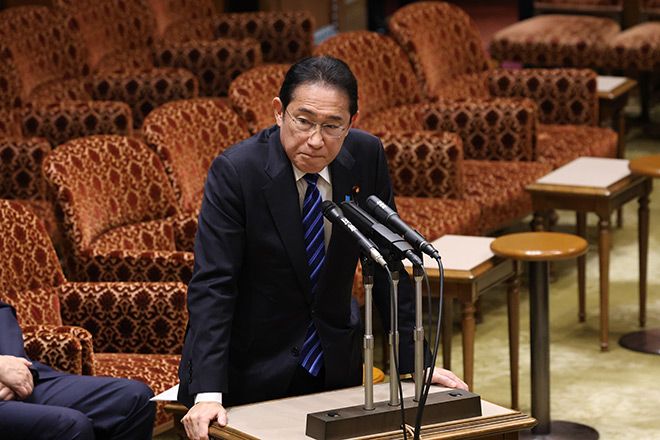The ruling Liberal Democratic Party made last-minute concessions on a bill to strengthen the Political Funds Control Act, but it is unlikely to close the many loopholes that are making the bill less effective.
The proposed amendments do not tighten regulations on donations by companies and organizations, and many of the system designs are half-baked, with decisions to be made in the future, leaving doubts about their feasibility.
The Diet should not rush to a vote, but should deliberate the amendments fairly and carefully.
In preparation for the passage of a bill to amend the Political Funds Control Act in the current Diet session, Prime Minister Kishida Fumio met with Yamaguchi Natsuo, leader of the Komeito Party, which is in a ruling coalition with the LDP, and Baba Nobuyuki, leader of the conservative opposition Japan Restoration Party, on May 31, and conveyed the LDP’s intention to partially accept the proposals from both parties.‘ suggestion.
The LDP subsequently presented an amended bill at a meeting of the House of Representatives’ Special Committee on Political Reform as its “final response” to the opposition parties’ demands.
The LDP also withdrew a proposal to lower the limit on the names of ticket buyers for political fundraising events that must be included in political funding reports.
The ruling party maintained its stance at 100,000 yen until the very end, but reluctantly abandoned its position after the Komeito Party insisted on lowering it to 50,000 yen.
The other measure was aimed at ensuring transparency in “policy activity expenses,” a loophole that allows political parties to provide funds directly to individual politicians and not be legally required to disclose how the money is used.
The LDP accepted a proposal from Japan Restoration Party that would set an annual cap on spending and require all related receipts to be made public after 10 years.
However, the LDP rejected the joint demands of the opposition parties to ban donations from corporations and other organizations and to strengthen the system of collective responsibility for violations of laws and regulations.
By making these small concessions, Kishida appears to have hoped to ensure the bill’s passage in the current Diet session, which is scheduled to run until June 23, thereby fulfilling his party’s “campaign promise,” as well as gaining the support of Japan Restoration Party and splitting the opposition camp.
However, it is too early to say that this legal reform will truly increase the transparency of political funds.
The revised rules for disclosing ticket purchasers, unlike donations, will tally up ticket purchase amounts instead of annual totals. This means that by increasing the number of fundraising events, it will be possible to raise the same amount of money as now without disclosing the names of ticket purchasers.
Regarding the disclosure of policy activity expenses, the appendix merely states that “the specific details will be considered and a conclusion will be reached at an early stage.”
Regarding Kishida’s proposal to the New Komeito Party to set up an independent body to check policy activity expenses, the government only said it would “consider it and take necessary measures.” This raises concerns that the government will stick to ad hoc responses.
Thirty years ago, the government forced through political reforms in the wake of a series of corruption scandals included a provision stipulating that restrictions on political donations by companies and organizations be reviewed in five years. However, this provision and many other provisions were ignored and went undiscussed.
If the Japan Innovation Party and Komeito Party agree to this amendment to the bill, they must not forget the heavy responsibility they bear in completing the LDP’s reforms.
The Liberal Democratic Party believes that the path to amending the law is clear, and is prepared to hold an early vote in the special committee.
However, the LDPof The proposed changes cover a wide range of issues, many of which need to be worked out in more detail, and some questions remain unresolved, such as how donations by companies and other organisations should be regulated.
These issues and questions need to be thoroughly discussed, including by the Prime Minister, who is also the President of the Liberal Democratic Party. The ruling party must not use its overwhelming power to ram through bills in the Diet.
–Asahi Shimbun, June 1st

